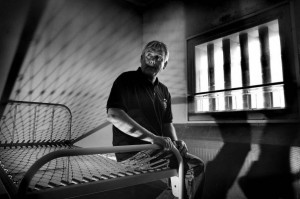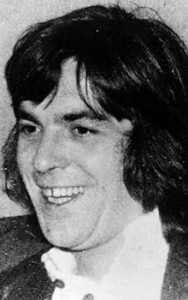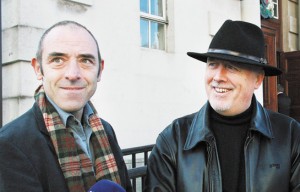Note: There are two versions of this article: the one published in the Irish News, and a slightly different one on the Bobby Sands website. Both verisons can be found below.
Hunger Striker Helped Others Through Toughest Times
Jim Gibney
Thursday Column, Irish News
8/07/10
It does not happen very often that the publication of this column coincides with the anniversary of one of the 10 men who died on hunger strike in the H-Blocks in 1981.
Today is one of those rare occasions. Twenty-nine years ago Joe McDonnell died after 61 days on hunger strike. Next Tuesday is Martin Hurson’s anniversary.
Joe was one of the oldest of 10 men yet he was also a very young man. He was just 29 years old.
Joe was married to Goretti and had two children – Bernadette and Joseph. Joe came from a large family of eight children.
He began his hunger strike on May 9 1981, four days after the death of Bobby Sands. Before his death, after 61 days, three other prisoners had died – Francis Hughes, Patsy O’Hara and Raymond McCreesh.
Joe would have heard the news of their deaths while he was in a cell in an H-Block or in the H-Block hospital wing.
There is no doubt that Joe would have known the fate that awaited him as the news of the death of each hunger striker reached his ears. Yet at no stage during his agonising hunger strike did he pause to consider his impending death.
In an article written by Danny Morrison several years ago, following a visit to the then closed and decaying Long Kesh, he recalled meeting Joe, two days before he died, in the canteen of the prison hospital.
With Joe were Tom McElwee, Kieran Doherty TD, Kevin Lynch and Mickey Devine.
Danny wrote: “Joe McDonnell, who had two days to live, was brought in on a wheelchair and kept joking throughout the visit. He smoked several cigarettes in between sipping water.”
Gerry Adams in his book Before the Dawn wrote about knowing Joe from being interned with him:
“Joe was a very happy-go-lucky guy.” He recalled Joe’s “sense of fun”.
“On the day he started his hunger strike, he sent me out a Kind Edward Cigar from his prison cell,” he said.
That wit greeted me when I first met Joe in Cage 3 in 1973 and on the two occasions I visited him when he was on hunger strike.
I wondered at the time, and still do to this day, where Joe and the other hunger strikers got their resolve to carry them beyond life.
Indeed the same question may be asked of their loved ones who stood with them as they faced their final moments.
Jim ‘Jazz’ McCann, then a very young prisoner, remembered his time with Joe on the blanket protest in the H-Blocks. “Joe was a tower of strength. He got a lot of us through the protest. He was forever the optimist. A ‘raker’ – the life and soul of the wing.”
Joe never took a visit with his family for almost five years because he refused to wear a prison uniform. But he “talked about Goretti and Bernadette and Joseph and his family, especially his sister Maura, every day and night,” according to Jim.
He was in constant contact with Goretti through comms and had visitors from across Belfast smuggle her comms to him.
Jim said: “Joe’s dream was to get a visit with Goretti and the children and to be reunited with them, wearing not a prison uniform but his own clothes.”
Former hunger striker Raymond McCartney described Joe as “the heartbeat of the wing. The wise ‘old’ man of the wing, who was very very protective of other prisoners.”
Joe had regularly argued for the hunger strike, two years before it actually began. To his comrades he was “rock-solid”, “unbending”, “stubborn and principled”, “a figure-head”, “a family man”, “a caring person”.
And a man who made others laugh while he got them through the toughest and most challenging of times.
Sourced from the Irish News
A slightly different version of this article appears on the Bobby Sands Trust website:
Joe McDonnell Tribute
July 8, 2010
Today is the 29th anniversary of the death on hunger strike of IRA Volunteer Joe McDonnell from West Belfast. Veteran republican Jim Gibney here pays tribute to the fifth hunger striker to die in the H-Blocks of Long Kesh.
It does not happen very often that the publication of this column [Jim’s weekly feature in the ‘Irish News’] coincides with the anniversary of one of the ten men who died on hunger strike in the H-Blocks in 1981. Today is one of those rare occasions. Twenty-nine years ago Joe Mc Donnell died after 61 days on hunger strike. He was one of the oldest of the ten men yet he was also a very young man. He was 30-years-old. Joe was married to Goretti and had two children, Bernadette and Joseph. Joe came from a large family of eight children.
He began his hunger strike on the 9th May 1981, four days after the death of Bobby Sands. Before his death, after sixty one days, three other prisoners had died – Francis Hughes, Patsy O’Hara and Raymond Mc Creesh.
Joe would have heard the news of their deaths while he was in a cell in an H-Block or in the H-Block hospital wing. There is no doubt that Joe would have known the fate that awaited him as the news of the death of each hunger striker reached his ears. Yet at no stage during his agonising hunger strike did he pause to consider his impending death.
In an article written by Danny Morrison several years ago, following a visit to the then closed and decaying Long Kesh, he recalled meeting Joe, two days before he died, in the canteen of the prison hospital. With Joe were Tom Mc Elwee, Kieran Doherty TD, Kevin Lynch and Mickey Devine.
Danny wrote: “Joe Mc Donnell, who had two days to live, was brought in on a wheelchair and kept joking throughout the visit. He smoked several cigarettes in between sipping water. I had been there to bring them up to date with our contacts with the British and the ultimately forlorn attempts to resolve the political status issue.”
Gerry Adams in his book ‘Before the Dawn’ wrote about knowing Joe from being interned with him: “Joe was a very happy-go-lucky guy.” He recalled Joe’s “sense of fun… On the day he started his hunger strike, he sent me out a King Edward Cigar from his prison cell.”
I wondered at the time and still do to this day where Joe and the other hunger strikers got their resolve to carry them beyond life. Indeed the same question may be asked of their loved ones who stood with them as they faced their final moments.
Three ex-prisoners who knew Joe as an active IRA volunteer outside and inside prison spoke to me about the man they knew. Seamy Finucane said Joe had a reputation in Andersonstown for being “a hands-on IRA operator”. He was a member of two active service units attached to the Belfast Brigade and Battalion staffs. He oozed confidence. “In his company you knew you were safe”.
“Being safe” around Joe is how a very young prisoner, Jim ‘Jazz’ Mc Cann, remembered his time with Joe on the blanket protest in the H-Blocks. “Joe was a tower of strength. He got a lot of us through the protest. He was forever the optimist. A ‘raker’, the life and soul of the wing.” Joe never took a visit with his family for almost five years because he refused to wear a prison uniform. But he “talked about Goretti and Bernadette and Jospeh and his family especially his sister Maura every day and night,” according to Jim. He was in constant contact with Goretti through comms and had visitors from across Belfast smuggle her comms to him.
Jim said, “Joe’s dream was to get a visit with Goretti and the children and to be reunited with them, wearing not a prison uniform but his own clothes.”
Former hunger striker Raymond Mc Cartney described Joe as “the heart-beat of the wing. The wise ‘old’ man of the wing, who was very protective of other prisoners.”
Joe had regularly argued for a hunger strike, two years before it actually began. To his comrades he was ‘rock-solid’, ‘unbending’, ‘stubborn and principled’, ‘a figure head’, ‘a family man’, ‘a caring person’.
And a man who made others laugh while he got them through the toughest and challenging of times.
Sourced from The Bobby Sands Trust website





 It has withstood the blows of a million years, and will do so to the end.
It has withstood the blows of a million years, and will do so to the end.